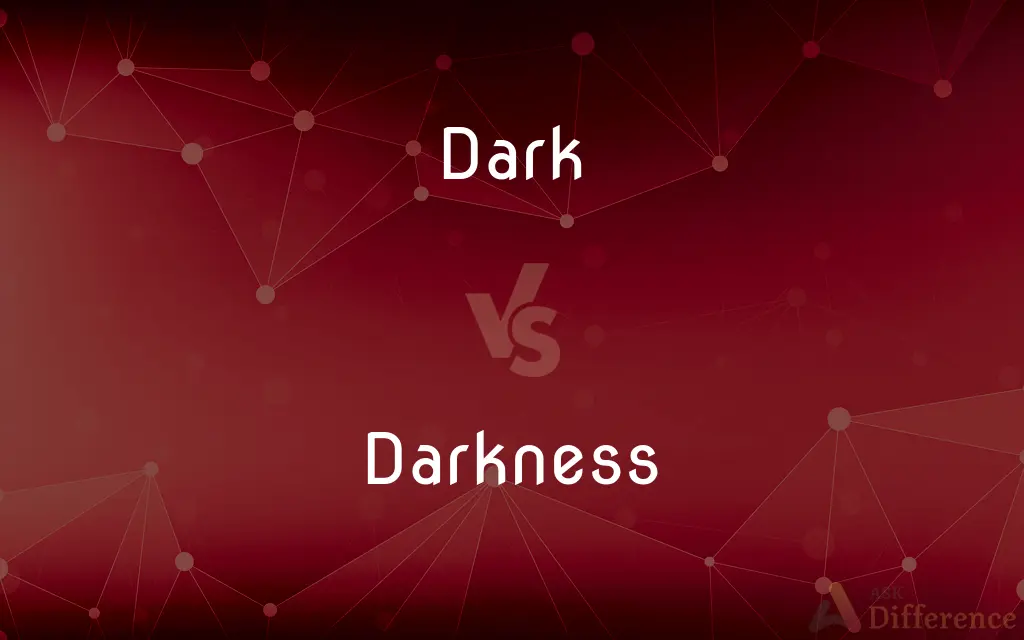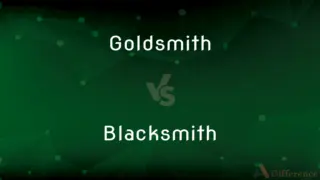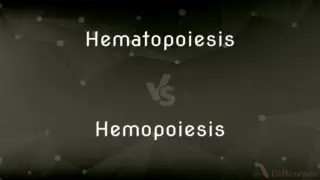Dark vs. Darkness — What's the Difference?
Edited by Tayyaba Rehman — By Urooj Arif — Updated on March 12, 2024
Dark describes the absence of light, while darkness refers to the condition or quality of being dark.

Difference Between Dark and Darkness
Table of Contents
ADVERTISEMENT
Key Differences
Dark is an adjective used to describe situations, objects, or areas with little or no light. For instance, a "dark room" implies that the room is dimly lit or not receiving much light. On the other hand, darkness is a noun that represents the state or quality of being dark, emphasizing the absence or lack of light in a more general or abstract sense.
While "dark" can modify specific nouns and is often used in a comparative sense (e.g., "darker than"), "darkness" encapsulates the concept of dark as a condition, often used to discuss the concept in a broader, more thematic way. For example, "the darkness of the night" refers to the pervading absence of light during nighttime.
In literature and art, "dark" is used to describe visual elements, tones, or moods, contributing to imagery or thematic content, such as a "dark palette" in painting or "dark themes" in a story. Meanwhile, "darkness" can symbolize deeper, often more abstract themes like evil, the unknown, or fear, extending beyond the literal absence of light to encompass metaphorical or symbolic meanings.
The use of "dark" can also extend to describing non-visual concepts, such as "dark humor" or "a dark period in history," indicating something is morose, grim, or sinister. "Darkness," in a similar non-literal sense, can represent ignorance, despair, or the metaphorical shadow cast by negative forces or events, as in "the darkness of ignorance."
While "dark" and "darkness" are closely related and sometimes used interchangeably, their nuances in usage highlight different aspects of the absence of light, with "dark" focusing more on specific, tangible elements, and "darkness" on the general ambiance, condition, or metaphorical interpretations of the dark.
ADVERTISEMENT
Comparison Chart
Part of Speech
Adjective
Noun
Usage
Describes something with little or no light.
Refers to the state or quality of being dark.
Context
Specific, tangible elements (e.g., "dark room").
General ambiance or condition (e.g., "the darkness of the night").
Metaphorical Use
Can describe non-visual concepts (e.g., "dark humor").
Often symbolizes deeper themes like evil, ignorance, or despair.
Comparative Forms
Can be used in comparative forms (e.g., "darker").
Used to discuss the concept of dark more broadly, without comparative forms.
Compare with Definitions
Dark
Lacking or having very little light.
The room was too dark to read in.
Darkness
The state or quality of being dark; absence of light.
The darkness enveloped the city during the blackout.
Dark
Morose or grim.
His mood was dark after the news.
Darkness
Symbolic of evil, ignorance, or despair.
The novel explores the darkness within human nature.
Dark
Suggesting a somber or evil quality.
The story took a dark turn.
Darkness
A condition characterized by the lack of illumination.
She feared the darkness of the basement.
Dark
Deep in shade or color.
She prefers dark colors for her designs.
Darkness
A period characterized by hardship or lack of enlightenment.
The book chronicles the darkness of those times.
Dark
Concealed or secret.
He kept his intentions dark.
Darkness
The unknown or unexplored, often causing fear.
He ventured into the darkness of the unknown territories.
Dark
Lacking or having very little light
A dark corner.
Darkness
Darkness, the polar opposite of brightness, is understood as a lack of illumination or an absence of visible light. Human vision is unable to distinguish color in conditions of either high brightness or very low brightness.
Dark
Lacking brightness
A dark day.
Darkness
Lacking or having very little light
A dark corner.
Dark
Reflecting only a small fraction of incident light; tending toward black
Dark clothing.
Darkness
Lacking brightness
A dark day.
Dark
Served without milk or cream
Dark coffee.
Darkness
Reflecting only a small fraction of incident light; tending toward black
Dark clothing.
Dark
Being or having a complexion that is not light in color.
Darkness
Served without milk or cream
Dark coffee.
Dark
Sullen or threatening
A dark scowl.
Darkness
Being or having a complexion that is not light in color.
Dark
Characterized by gloom or pessimism; dismal or bleak
A dark day for the economy.
Dark predictions of what lies in store.
Darkness
Sullen or threatening
A dark scowl.
Dark
Being or characterized by morbid or grimly satiric humor.
Darkness
Characterized by gloom or pessimism; dismal or bleak
A dark day for the economy.
Dark predictions of what lies in store.
Dark
Unknown or concealed; mysterious
A dark secret.
The dark workings of the unconscious.
Darkness
Being or characterized by morbid or grimly satiric humor.
Dark
Lacking enlightenment, knowledge, or culture
A dark age in the history of education.
Darkness
Unknown or concealed; mysterious
A dark secret.
The dark workings of the unconscious.
Dark
Evil in nature or effect; sinister
"churned up dark undercurrents of ethnic and religious hostility" (Peter Maas).
Darkness
Lacking enlightenment, knowledge, or culture
A dark age in the history of education.
Dark
Morally corrupt; vicious
Dark deeds.
A dark past.
Darkness
Evil in nature or effect; sinister
"churned up dark undercurrents of ethnic and religious hostility" (Peter Maas).
Dark
Having richness or depth
A dark, melancholy vocal tone.
Darkness
Morally corrupt; vicious
Dark deeds.
A dark past.
Dark
Not giving performances; closed
The movie theater is dark on Mondays.
Darkness
Having richness or depth
A dark, melancholy vocal tone.
Dark
(Linguistics) Pronounced with the back of the tongue raised toward the velum. Used of the sound (l) in words like full.
Darkness
Not giving performances; closed
The movie theater is dark on Mondays.
Dark
Absence of light.
Darkness
(Linguistics) Pronounced with the back of the tongue raised toward the velum. Used of the sound (l) in words like full.
Dark
A place having little or no light.
Darkness
Absence of light.
Dark
Night; nightfall
Home before dark.
Darkness
A place having little or no light.
Dark
A deep hue or color.
Darkness
Night; nightfall
Home before dark.
Dark
Darks Pieces of laundry having a dark color.
Darkness
A deep hue or color.
Dark
Having an absolute or (more often) relative lack of light.
The room was too dark for reading.
Darkness
Darks Pieces of laundry having a dark color.
Dark
(of a source of light) Extinguished.
Dark signals should be treated as all-way stop signs.
Darkness
(uncountable) The state of being dark; lack of light; the absolute or comparative absence of light.
The darkness of the room made it difficult to see.
Dark
Deprived of sight; blind.
Darkness
(uncountable) The state or quality of reflecting little light, of tending to a blackish or brownish color.
The darkness of her skin betrayed her Mediterranean heritage.
Dark
Transmitting, reflecting, or receiving inadequate light to render timely discernment or comprehension: caliginous, darkling, dim, gloomy, lightless, sombre.
Darkness
(uncountable) Gloom; gloominess; depression.
Dark
(of colour) Dull or deeper in hue; not bright or light.
My sister's hair is darker than mine;
Her skin grew dark with a suntan
Darkness
(countable) The product of being dark.
Dark
Ambiguously or unclearly expressed: enigmatic, esoteric, mysterious, obscure, undefined.
Darkness
(uncountable) Lack of understanding or compassion; spiritual or mental blindness.
Dark
Marked by or conducted with secrecy: hidden, secret; clandestine, surreptitious.
Darkness
(uncountable) Secrecy; concealment.
Dark
Without moral or spiritual light; sinister, malign.
A dark villain;
A dark deed
Darkness
(uncountable) Lack of knowledge; obscurity or meaning or intelligibility; the unknown.
Dark
Conducive to hopelessness; depressing or bleak.
The Great Depression was a dark time;
The film was a dark psychological thriller
Darkness
(uncountable) Hell.
Dark
(of a time period) Lacking progress in science or the arts.
Darkness
The absence of light; blackness; obscurity; gloom.
And darkness was upon the face of the deep.
Dark
Extremely sad, depressing, or somber, typically due to, or marked by, a tragic or undesirable event.
September 11, 2001, the day when four terrorist attacks destroyed the Twin Towers and the Pentagon, is often referred to as America's dark day.
Darkness
A state of privacy; secrecy.
What I tell you in darkness, that speak ye in light.
Dark
With emphasis placed on the unpleasant aspects of life; said of a work of fiction, a work of nonfiction presented in narrative form, or a portion of either.
The ending of this book is rather dark.
Darkness
A state of ignorance or error, especially on moral or religious subjects; hence, wickedness; impurity.
Men loved darkness rather than light, because their deeds were evil.
Pursue these sons of darkness: drive them outFrom all heaven's bounds.
Dark
Off the air; not transmitting.
Darkness
Want of clearness or perspicuity; obscurity; as, the darkness of a subject, or of a discussion.
Dark
A complete or (more often) partial absence of light.
Dark surrounds us completely.
Darkness
A state of distress or trouble.
A day of clouds and of thick darkness.
Dark
(uncountable) Ignorance.
We kept him in the dark.
The lawyer was left in the dark as to why the jury was dismissed.
Darkness
Absence of light or illumination
Dark
(uncountable) Nightfall.
It was after dark before we got to playing baseball.
Darkness
An unilluminated area;
He moved off into the darkness
Dark
A dark shade or dark passage in a painting, engraving, etc.
Darkness
Absence of moral or spiritual values;
The powers of darkness
Dark
(intransitive) To grow or become dark, darken.
Darkness
An unenlightened state;
He was in the dark concerning their intentions
His lectures dispelled the darkness
Dark
(intransitive) To remain in the dark, lurk, lie hidden or concealed.
Darkness
Having a dark or somber color
Dark
(transitive) To make dark, darken; to obscure.
Darkness
A swarthy complexion
Dark
Destitute, or partially destitute, of light; not receiving, reflecting, or radiating light; wholly or partially black, or of some deep shade of color; not light-colored; as, a dark room; a dark day; dark cloth; dark paint; a dark complexion.
O dark, dark, dark, amid the blaze of noon,Irrecoverably dark, total eclipseWithout all hope of day!
In the dark and silent grave.
Dark
Not clear to the understanding; not easily seen through; obscure; mysterious; hidden.
The dark problems of existence.
What may seem dark at the first, will afterward be found more plain.
What's your dark meaning, mouse, of this light word?
Dark
Destitute of knowledge and culture; in moral or intellectual darkness; unrefined; ignorant.
The age wherein he lived was dark, but heCould not want light who taught the world to see.
The tenth century used to be reckoned by mediæval historians as the darkest part of this intellectual night.
Dark
Evincing black or foul traits of character; vile; wicked; atrocious; as, a dark villain; a dark deed.
Left him at large to his own dark designs.
Dark
Foreboding evil; gloomy; jealous; suspicious.
More dark and dark our woes.
A deep melancholy took possesion of him, and gave a dark tinge to all his views of human nature.
There is, in every true woman-s heart, a spark of heavenly fire, which beams and blazes in the dark hour of adversity.
Dark
Deprived of sight; blind.
He was, I think, at this time quite dark, and so had been for some years.
Dark
Absence of light; darkness; obscurity; a place where there is little or no light.
Here stood he in the dark, his sharp sword out.
Dark
The condition of ignorance; gloom; secrecy.
Look, what you do, you do it still i' th' dark.
Till we perceive by our own understandings, we are as much in the dark, and as void of knowledge, as before.
Dark
A dark shade or dark passage in a painting, engraving, or the like; as, the light and darks are well contrasted.
The lights may serve for a repose to the darks, and the darks to the lights.
Dark
To darken; to obscure.
Dark
Absence of light or illumination
Dark
Absence of moral or spiritual values;
The powers of darkness
Dark
An unilluminated area;
He moved off into the darkness
Dark
The time after sunset and before sunrise while it is dark outside
Dark
An unenlightened state;
He was in the dark concerning their intentions
His lectures dispelled the darkness
Dark
Devoid or partially devoid of light or brightness; shadowed or black or somber-colored;
Sitting in a dark corner
A dark day
Dark shadows
The theater is dark on Mondays
Dark as the inside of a black cat
Dark
(used of color) having a dark hue;
Dark green
Dark glasses
Dark colors like wine red or navy blue
Dark
Brunet (used of hair or skin or eyes);
Dark eyes
Dark
Stemming from evil characteristics or forces; wicked or dishonorable;
Black deeds
A black lie
His black heart has concocted yet another black deed
Darth Vader of the dark side
A dark purpose
Dark undercurrents of ethnic hostility
The scheme of some sinister intelligence bent on punishing him
Dark
Causing dejection;
A blue day
The dark days of the war
A week of rainy depressing weather
A disconsolate winter landscape
The first dismal dispiriting days of November
A dark gloomy day
Grim rainy weather
Dark
Secret;
Keep it dark
The dark mysteries of Africa and the fabled wonders of the East
Dark
Showing a brooding ill humor;
A dark scowl
The proverbially dour New England Puritan
A glum, hopeless shrug
He sat in moody silence
A morose and unsociable manner
A saturnine, almost misanthropic young genius
A sour temper
A sullen crowd
Dark
Lacking enlightenment or knowledge or culture;
This benighted country
Benighted ages of barbarism and superstition
The dark ages
A dark age in the history of education
Dark
Marked by difficulty of style or expression;
Much that was dark is now quite clear to me
Those who do not appreciate Kafka's work say his style is obscure
Dark
Having skin rich in melanin pigments;
National Association for the Advancement of Colored People
The dark races
Dark-skinned peoples
Dark
Not giving performances; closed;
The theater is dark on Mondays
Common Curiosities
Is "darkness" always associated with negativity?
Darkness often carries negative connotations but can also represent a neutral or even positive state, depending on the context.
How can "darkness" be symbolic?
Darkness can symbolize a range of concepts from evil and ignorance to the unknown, often depending on the thematic context within a narrative or discussion.
Can "dark" refer to color?
Yes, "dark" can describe deep shades or colors, indicating they are closer to black or far from white.
How is "dark" used in literature?
In literature, "dark" is often used to set the mood, describe settings, or signify sinister or mysterious elements within the narrative.
Can "dark" and "darkness" be used interchangeably?
While closely related, they're not always interchangeable due to their different grammatical roles and nuanced meanings.
Does "darkness" have a physical form?
Darkness itself doesn't have a physical form; it represents the absence of light or a metaphorical depth of something unseen or unknown.
Can "darkness" be used to describe a period of time?
Yes, "darkness" can metaphorically describe a period characterized by difficulty, ignorance, or turmoil, such as "the darkness of the Middle Ages."
Are there positive uses of "darkness"?
In some contexts, "darkness" can be seen positively, such as representing rest, mystery, or the natural cycle of day and night.
Is "dark" always negative when used in expressions?
Not necessarily; "dark" can also refer to humor or preferences that are unconventional, without a negative connotation.
How do cultural perceptions of "dark" and "darkness" differ?
Cultural perceptions can vary greatly, with some cultures associating darkness with negativity and others seeing it as part of natural balance or as a space for introspection and renewal.
Share Your Discovery

Previous Comparison
Goldsmith vs. Blacksmith
Next Comparison
Hematopoiesis vs. HemopoiesisAuthor Spotlight
Written by
Urooj ArifUrooj is a skilled content writer at Ask Difference, known for her exceptional ability to simplify complex topics into engaging and informative content. With a passion for research and a flair for clear, concise writing, she consistently delivers articles that resonate with our diverse audience.
Edited by
Tayyaba RehmanTayyaba Rehman is a distinguished writer, currently serving as a primary contributor to askdifference.com. As a researcher in semantics and etymology, Tayyaba's passion for the complexity of languages and their distinctions has found a perfect home on the platform. Tayyaba delves into the intricacies of language, distinguishing between commonly confused words and phrases, thereby providing clarity for readers worldwide.
















































